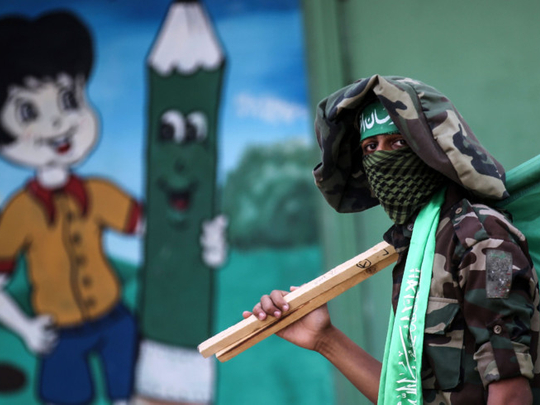
Dubai: Palestinian Islamist Hamas group said on Sunday it has dissolved its administration that runs Gaza and agrees to hold general elections in order to end a long-running feud with President Mahmoud Abbas’s Fatah movement.
The last Palestinian legislative election was held in 2006 when Hamas scored a surprise victory, which laid the ground for a political rupture. Hamas and Fatah fought a short civil war in Gaza in 2007 and since then Hamas has governed the small coastal enclave.
Numerous attempts since 2011 to reconcile the two movements and form a power-sharing unity government in Gaza and the West Bank have so far failed. Hamas and Fatah agreed in 2014 to form a national reconciliation government, but despite that agreement, Hamas’s shadow government has continued to rule the Gaza Strip.
Hamas said in a statement on Sunday that it has dissolved its shadow government, that it will allow the reconciliation government to operate in Gaza and that it agrees to hold elections and enter talks with Fatah.
Mahmoud Aloul, a senior Fatah official welcomed cautiously Hamas’s position.
“If this is Hamas statement, then this is a positive sign,” he told Reuters. “We in Fatah movement are ready to implement reconciliation.” Hoping to pressure Hamas to relinquish control of Gaza, Abbas has cut payments to Israel for the electricity it supplies to Gaza. This means that electricity has often been provided for less than four hours a day, and never more than six.
Representatives for Abbas, who is in New York ahead of the UN General Assembly this week, could not be reached for comment, nor could Fatah representatives presently in Egypt, which has been hosting talks with Hamas.
Some polls show that if parliamentary elections were held now, Hamas would win them in both Gaza and the Israeli-occupied West Bank, the seat of Abbas’s Palestinian Authority.
The Western-backed Abbas, 82, is now 12 years into what was to be a four-year term and is an unpopular leader according to opinion polls.
He has no clear successor and there are no steps being taken toward a presidential election any time soon.
In April, Abbas announced “unprecedented” steps to end the political and geographical division with the Gaza Strip and to reassume Palestinian National Authority (PNA) control there.
Afterwords the PNA applied heavy economic pressure on Hamas, which has ruled Gaza since 2007, in order to weaken its grip there.
The Palestinian unity government cut off nearly all financial assistance to Gaza slashing government employees salaries by one-third.
It also halted the transfer of medicines and health equipment and stopped paying Gaza’s power plant bill creating a humanitarian crisis, which the UN has termed “unlivable” in the heavily-populated enclave.
Last month, the head of the International Committee of the Red Cross on Thursday warned of a “crisis of hope” in Gaza, calling the humanitarian situation in the Palestinian enclave “dire”.
Peter Maurer said conditions in Gaza were worsening by the day, with the two million residents getting only three or four hours of mains electricity a day.












